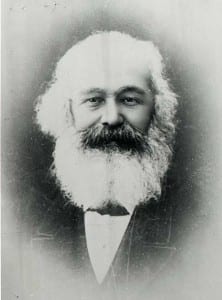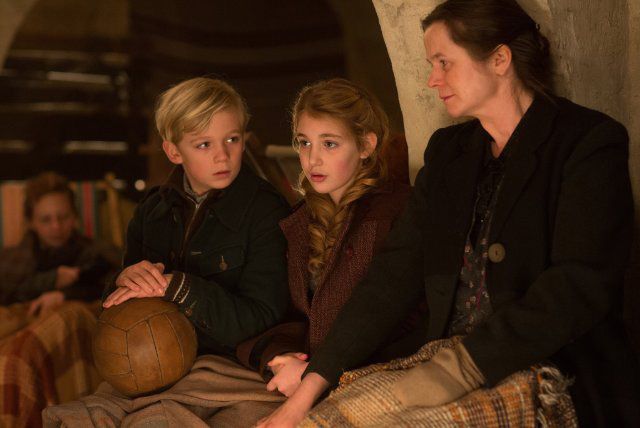By Gaither Stewart
(Rome)

Marx: Always insulted and slandered by his enemies but rarely read or understood.
I speak of myself as a Socialist but in my innermost self I think of myself as a Communist. I prefer the Communist name to the beautiful word “Socialist” because the latter has in many places been either altered, weakened, diluted, deformed, its real meaning betrayed by social democrats happy to do capitalism’s bidding, and it has become ambiguous and has been ostracized as in the capitalist homeland, USA. Moreover, as a rule the Socialist designation is qualified in one way or another that detracts from its real meaning: Democratic Socialist, National Socialist, Freedom Socialist, Progressive Socialist, ad absurdum. Anything you want it to mean. Still, although very few Americans want to be known as Socialists, in recent times one hears it used more and more often, as in the organization, Socialists of America.
The term, Left, has also become insufficient since it falls into that same category of politically toxic ambiguity. In my native America many Democrats who behave and vote as rightists like to consider themselves of the Left. In my adopted country of Italy, Left or Center Left comprehends a varied assortment of ex-Christian Democrats, ex-Socialists (rightwing), rightwing labor leaders, populists, ex-Communists now of unidentifiable positions.
Communism is another story. In the West, though less ambiguous, it is simply a bad word. Now, I do not insist that to be genuinely of the Left one must be a Communist … although it helps clarify where you stand. Someone once suggested that maybe I am in reality a Communitarian. Perhaps. Most certainly. However, the majority of the mainline Left will think, “tsk tsk. Naïve! A Communist! And in these times. Another story of mistaken paths. And in these times, since the Fall of the Berlin wall and the collapse of the Communist experiment in East Europe, he still believes that. Tsk, tsk, too bad!”
With an Appendix and Prefatory Note on Bertrand Russell’s Why I am Not A Communist
Not only right wingers like to point out Communism’s failures, especially the failures in Soviet Communism (many of them externally triggered), but also the professional anticommunist left, chiefly comprised of comfortable liberals and apostates. The jeremiad is long and tiresome: the ironclad bureaucracy, the corruption inherent in state planning and state ownership, the invasion of the state into the private lives of its citizens, police controls, the supposed horror of the gulags (much amplified by uncorroborated, non-stop Western propaganda, as mentioned by Michael Parenti in his classic essay, The Overthrow of Communism), the one-party system representing only one class (which incidentally also happens in the United States, albeit in America it only represents the infinitesimally small plutocracy and uses two different masks to fool the masses), the dichotomy between privileged Party class and the people (the income inequality between top Soviet politicians and the workers rarely exceeded a factor of 20 or 30, whereas in the West it’s common to find magnates whose incomes represent thousands of times the earnings of average workers; the lack of “democracy” as the non-Communist West understands it. Critics chuckle and indulge themselves before arriving at the conclusion intended from the start: Communism in practice has never worked and will never work. The tragic irony is that many of the criticisms of Soviet Communism today apply to the USA and increasingly to the entire capitalist world.
Thus the necessity to revisit the old question soon arises again: how true is Western criticism of the Soviet experience in Communism? As a rule such outright condemnation of Communism is based on prejudice. Knee-jerk prejudices inculcated into the populace, anti-Socialist/ anti- Communist propaganda infecting the entire lives of most people of the West. Actually more than mere propaganda but hostility deeply engrained in the Western DNA from birth. Prejudices rarely reflect the truth. So what convinced me?
Well, I found in Marxist Socialism an inkling of what I desired: the intention of the deliverance of man from dependence on a rigged system of economics and his eventual victory over inhuman Capitalism which we see now from day to day on its last legs.
Here a few words about Soviet Communism are in order: Communism in twentieth century Russia first of all must be compared with the horrors of the Tsarism it overthrew and replaced. Pre-revolutionary Russia was a country in which the masses consisted chiefly of poor, uneducated and dumbed-down peasants, a society in which inequality and injustice ruled. Communism in Russia had a savage pre-history. Soviet Communism was a very Russian system, the reasons for which date far back into the Russian nineteenth century: the enduring sense of guilt on the part of the educated upper classes and the nobility toward the suffering peoples. Their sense of guilt was, by way of example, much more powerful than white America’s sense of guilt toward its black slaves and ex-slaves, a guilt which affected the real powers in the USA in a minor way as compared to Russia.
Russian revolutionaries had in common a trait absent in the West: a sense of deterministic guilt toward labouring people, especially the peasantry. Communism appealed to the deeply religious Russian masses also because of its common traits with Christianity: the people were deeply linked both to the land and to Russian Orthodoxy. Centuries before the arrival of the Bolsheviks, the world outlook—the famous mirovozreniye—of the masses was already collective—not individual—; they were mentally prepared for the message of Communism.
The educated upper classes felt guilty also because of their divorce from the land and a realization that their lives were based on the exploitation of the people’s labor on the land. The consciousness of the sin of their social position created a great sense of repentance in the upper classes. Greed and selfishness never played the role in Russia as in the USA. Many of the upper classes and nobility felt the loneliness of their guilty position and wanted to reunite with the land and the people.
If the upper classes were moved by guilt, the lower classes were moved by honor. All Russians had always felt an aversion to the crass and greedy bourgeoisie and as the 19th century ended revolutionaries felt a dread of the bourgeois stage of Capitalism predicted by Marx, which they hoped to avoid. Insurrection and immediate revolution was the only possibility for such an achievement, contrary to earlier 19th century Socialist theories. So it was not surprising that Tsardom was overthrown so quickly when the Communist-led revolt occurred and the Revolution began.
And no wonder the capitalist world was terrified. Horrified by the words “Socialism” and “Communism”, the combined military forces of the capitalist world first attacked the Russian Revolution while it was underway, then for seventy years it attacked, isolated, embargoed the Soviet Union and still today anything that smacks of Communism.
Yet Russia had enough time—those seventy years—to offer a successful and appealing alternative to Capitalism, as predicted by Socialist theorists. Such background in the birth of Russian Communism and the example it set for much of the world derived from the sacred Russian conviction that Russia was destined to save the world: the dream of the Third Rome of devout pre-revolutionary Orthodox easily mutated into Communist messianism.
Such factors were missing (and historically and socially impossible in Western Communism). When I began maturing socially and politically, the narrative of my more romantic self—my religious upbringing, my working class family, and also my farmer grandfather’s close link to the land—inclined me toward the messianic vision of Russian Communism. However, my Western world outlook and personal experience dictated Western-style Socialism/Communism as the model to be followed. Though models in Russian style revolution are spiritually inspiring, they are largely inapplicable in the West because of a total absence of the above socio-political factors of pre-revolutionary Russia that made that revolution possible. Neither the (penitent) nobility-upper classes nor a communitarian peasantry existed in the West capable of creating the necessary revolutionary energy to hurtle the West toward another revolution, while at the same time the spirit of the English, French and American revolutions had extinguished long ago.
Socialism/Communism is the only force that has thus far been capable of defeating Capitalism in many countries at once and of building new societies on its ashes, the ironic result of a century long battle for social justice, that Christian concept around which the Russian Revolutionary revolved.
Social justice is the aspect of Communism that has appealed most to me personally and that came to appeal to billions of peoples of the world. That appeal has never died. Today many peoples of former Communist East Europe testify that they miss their lifestyle under the social state offered by Socialism/Communism. More and more peoples of East Europe today confirm their belief in the validity of Socialist tenets by voting back into power Communist or Socialist parties chiefly because Socialism has a soul—a social soul—lacking in Capitalism. A secularized soul, yes, originally a rejection of pure religious-inspired spiritualism, but a soul based on the relation of man to man and not of man’s relation with industry or its economic embodiment in institutionalized selfishness. There is a growing realization that behind economic activity stand real people, people who can dissipate the ghostly world of totalitarian capitalist economics. This aspect of Marxism is no longer connected with materialism, but with socialist spirituality.
After having grown up in a fanatically religious environment, I personally am haunted by the missing element in Western society: a deeply engrained sense of social justice. I am personally bewildered, offended, horrified by the inequality in my native America, and now in my adopted Europe. I am outraged by the philosophy that greed is good. That everyone is encouraged to take all of everything one can. Not only the injustice of economic inequality but also the objective lack of equal opportunity. It is untrue that the poor choose to be poor. It is untrue that the riches in the hands of a few and little in the hands of the poor are the proof that the poor deserve their situation and would be forever satisfied with home, car and TV. Nor do I accept that anyone really wants to be dumb, even if many act as if they prefer ignorance.
Universal surveys show that a great majority of Earth’s population believe the major world problem is Capitalism—the ruthless exploitation of human beings, defenseless animals and nature by capital.
For that reason I strongly favor investment of state funds and energies in public schools, free or easily affordable university study, free health care and free public urban transportation. That is, I favor a huge injection of the state into the everyday lives of peoples. Such vital matters in favor of peoples are what Socialism is about.
Still, it would be foolish to deny the influence of Russian Communism—the influence of the Socialist system, not the entire Soviet model—on my socio-political mindset of today. Russian Communism’s messianism and its vision of a future society no longer a slave of economics reflected my Christian religious/spiritual upbringing. It seemed to me—as it did to billions of people of the other world—that the lever to turn the world upside down had been found.
Nor can I deny the strong influence of the Socialism/Communism projected in West Europe where I began to mature intellectually. Europe’s absorption of many aspects of Socialism/Communism is reflected in the European welfare state constructed throughout the twentieth century—Europe’s great modern contribution to mankind—today being undermined and viciously unraveled by the same greedy Capitalism. But the Russian model also plays a role in my case because of my love for that land and for the accomplishments for the rest of the world of its Communism which was born and developed in a manner vastly different from that of the West. Yet Western Communism after all was also born from many aspects of the Russian experience.
So what Russian Communist influences do I have in mind? It has been said that the entire history of the Russian intelligentsia beginning in the early nineteenth century was a preparation for Communism. The model developed in Russia included above all “the thirst for social righteousness and equality, recognition of the working class as the highest type of humanity, aversion to Capitalism and the bourgeoisie, the striving for an integrated world outlook and an integrated relation to life, sectarian intolerance, a suspicious and hostile attitude to the class of the cultured elite, an exclusive this-worldliness, a denial of spirit and of spiritual values, a well nigh religious devotion to materialism.” However I do not accept that my disagreement with the latter two traits, which place me in the Western camp of Communism, distance me from Communism as such.” (This paragraph is in reference to Nicolas Berdyaev)
So again: why do I think of myself a Communist and not simply Leftist? Not even a radical Leftist which people tend to read simply as anarchist or “terrorist” (always a slippery, invidious word, as Churchill himself recognized, your terrorist is someone else’s freedom fighter). I think of myself as Communist to avoid such confusion. I began thinking in this manner because of two principal aspects of Marxism: on the one hand, the fundamental nature of economics which determines a man’s social class that in turn determines his actions and thoughts. On the other hand, the spiritual side of Marxism that at first seems to contradict its economic determinism: the messianic role it assigns to working people—corresponding to the Christian doctrine of the primacy of the role of the meek and the poor—destined to free humanity from slavery. I find sufficient the idealism of Karl Marx to counter the dehumanization in Capitalism which makes man dependent on his own production.
In the USA someone comments, “Oh, then you’re a Democrat.”
“Of course not,” I reply.
In Italy the question is the same: then you’re for the Partito Democratico? My answer is the same: Of course not. Here you don’t know whether you’re voting for ex-Christian Democrats, rightwing Liberals or Republicans, or in the best of cases for an ex-Communist who changed his mind and abandoned core principles. No, I would not feel at home in any of those places.
Not that my non-support for such parties includes my vote for leftist parties in national elections. Not at all. I have never voted anywhere. Unbelievable to people who still believe in ballots and urns and election campaigns and its promises and financing and all that blather. No, I have never voted in any election. Anywhere. Ever. And I don’t plan to begin voting now. I’m glad Bill de Blasio was elected Mayor of New York City and I would send congratulations to him. But I have no idea of who financed him to get there and what price he must now pay for his funding. According to his PR and also rabid rightists, he ìs of the extreme Left. Very good … if he can change the entire complexion of Manhattan.
So my position is more or less ideological. But Communist? one still wonders. Old-fashioned? Outdated? Tried and failed? Old Marxist stuff you heard about in school? Well, I say, fuck such conditioned reactions and fuck those who do the conditioning. Especially them.
Meanwhile, fuck the Center, too. Above all, fuck the Center. The sense of marketing hype and political spin is only heightened by the fact that we’re told that the Center is allegedly “persuadable”. For, at the same time, it is already the majority. That’s right: we’re told that the “New American Center” constitutes 51% of the electorate. That sounds like a corporate-funded centrist’s dream. So fuck the Center as well as the tamed Left. I’m talking here about the liberaloid left.
Less inspirational are voices that reluctantly acknowledge the status quo because of resistance against big change, certainly against revolution. Desperate jeremiads in America, in times when even our brightest leaders fear ‘apocalypse now’, are commonplace. How the world escaped the global nuclear war calamity that bedeviled my childhood still seems miraculous. Or the equal horror that sprawling Communism would bury us. Reality outsmarts nearly all predictions, dire or otherwise.
Now we have terrorism to re-ignite current fear-thresholds; no mushroom clouds have outdone worldwide genocides since 9/11. The year 2001 sparked a mania. Excluding the Confederate rebellion, our American legacy is so-called evolutionary reforms, not the massive upheavals of revolution. We haven’t had a revolution in centuries. Reform is the Left’s model of change … but what reforms? Reforms for the “worse” —the brand that Barack Obama and corporatized Democrats seem to specialize on. And more such reforms are surely on the way. Still, most of the rest of the world considers the home of global corporate totalitarian Capitalism, corporate democracy and corporate freedom, the good ol’ USA, the rogue super nation of the world. Rogue nation, the term once liberally applied by the USA to the “evil” empire of Communism, the USSR.
Filled with hubris from its inception, the exceptional USA still believes itself exempt from world rules of behavior. The USA, where not only public ethics hardly exist, personal morality is also vanishing at an astonishing pace and few voices remain to confront inequality. Europe too is in fact turning its back on America, despite the enduring European belief in American democracy and capitalistic Europe’s stubborn imitations of America. So, for me, Europe and its dwindling welfare state, are no longer acceptable models either. The question then is, what remains?
Today many Italian Communists are Christians. A paradox. Italian Communists rediscovered the Catholic Church at the same time other Italians were moving away from it. The great majority of Italians today who are not agnostic are simply technical Catholics—baptized at birth, and go to church only for communions and funerals. The Church and the faith mark the beginning and the end of life. All the inbetween is life itself. Because of the powerful presence of the Vatican in Rome, because of the Church’s anathemas and judgments on and invasions into civil issues like divorce and abortion and the hard Marxist-Leninist positions on religion in general, the religious question has always been difficult for Italian Communists. I do not forget one Rome Communist’s summation of the religious question precisely during the time Italian Communists began returning to the Church: “The Pope, his infallibility and his dogmas, the rites, myths, saints, all those millennial customs, and bureaucratic structures are a lot of nonsense. In that sense, Catholicism is the queerest sect of our times. Yet we respect the institution since it is so quintessentially Italian.” Ambiguous, but clearly not in conformity with Lenin who preached that “religion was purely a question of revolutionary conflict” while he summoned men to the “assault of heaven” and opposed any attempt to combine Christianity with Socialism.
Pure materialism is thus a complex question for me. I have to take exception to Christianity’s claim that the human soul is of more value than all the kingdoms of the world, yet I agree that every human being is individual and never to be repeated, a biological individualism which is not to be compared with the personality which belongs to the spiritual world, and which, in the final analysis, is a stumbling block for my Communism. I am not at all hostile to the individual man, the personality, who is more than a member of a social class. I consider myself a member of a spiritual human society which I nonetheless perceive of as an aspired to classless society.
I think there is no reason to dwell on the affirmation that “Capitalism dehumanizes human life”, as per Nicolas Berdyaev. Sometimes seen as a Christian Existentialist, Berdyaev was an early Marxist, who was exiled from Communist Russia in 1922 because of his severe views on Bolshevism. Yet his summation underlines the evangelical truth that man does not live by bread alone and that Communists cannot be condemned for showing that though bread alone is not enough, man still does live by bread and there must be enough of it for all.
Though the individual is a revolutionary, Berdyaev concludes, the masses are conservative.
About the author
The Fifth Sun (Punto Press Publishing).
APPENDIX
When Bertrand Russell declared himself an anticommunist
A prefatory note by Patrice Greanville
Apparently, as the essay below indicates, even well-intentioned geniuses like Bertrand Russell can be alarmingly wrong when it comes to communism. Most likely the product of deeply held but unconscious class prejudices (the product of an eccentric aristocratic family, Russell after all was formally a Lord and a distinguished mathematician, and for most of his life he was accorded deferential treatment in Britain and elsewhere) his attacks on communism clearly proceed from a very shallow and invidious perspective, and his cavalier dismissal of Marxism is shameful and shoddy for a professional philosopher. While in his later years Russell—commendably—became a prominent figure in the world struggle against US imperialism and constant war (he was a pivotal founding member of the International War Crimes Tribunal on Vietnam, often called the Russell Tribunal)) a few decades before, from the 1930s to the late 1950s, as a hard-to-classify card-carrying anticommunist he was an acerbic critic of communism, even advocating on several occasions the nuclear bombing of the Soviet Union. How could Russell, who incarnated logic and the systematic, impartial acquisition and application of knowledge, square his opposition to American-led Western imperialism with hatred for socialism remains a mystery. The contradiction is perverse when we we realize that he was not oblivious to the ghastly flaws and crimes of the bourgeois order. It was him who memorably said,
“Why I am Not a Communist”
by Betrand Russell I n relation to any political doctrine there are two questions to be asked: (1) Are its theoretical tenets true? (2) Is its practical policy likely to increase human happiness? For my part, I think the theoretical tenets of Communism are false, and I think its practical maxims are such as to produce an immeasurable increase of human misery.
I have always disagreed with Marx. My first hostile criticism of him was published in 1896. But my objections to modern Communism go deeper than my objections to Marx. It is the abandonment of democracy that I find particularly disastrous. A minority resting its powers upon the activities of secret police is bound to be cruel, oppressive and obscuarantist. The dangers of the irresponsible power cane to be generally recognized during the eighteenth and nineteenth centuries, but those who have forgotten all that was painfully learnt during the days of absolute monarchy, and have gone back to what was worst in the middle ages under the curious delusion that they were in the vanguard of progress.
There are signs that in course of time the Russian régime will become more liberal. But, although this is possible, it is very far from certain. In the meantime, all those who value not only art and science but a sufficiency of bread and freedom from the fear that a careless word by their children to a schoolteacher may condemn them to forced labour in a Siberian wilderness, must do what lies in their power to preserve in their own countries a less servile and more prosperous manner of life.
There are those who, oppressed by the evils of Communism, are led to the conclusion that the only effective way to combat these evils is by means of a world war. I think this a mistake. At one time such a policy might have been possible, but now war has become so terrible and Communism has become so powerful that no one can tell what would be left after a world war, and whatever might be left would probably be at least as bad as present -day Communism. This forecast does not depend upon the inevitable effects of mass destruction by means of hydrogen and cobalt bombs and perhaps of ingeniously propagated plagues. The way to combat Communism is not war. What is needed in addition to such armaments as will deter Communists from attacking the West, is a diminution of the grounds for discontent in the less prosperous parts of the non-communist world. In most of the countries of Asia, there is abject poverty which the West ought to alleviate as far as it lies in its power to do so. There is also a great bitterness which was caused by the centuries of European insolent domination in Asia. This ought to be dealt with by a combination of patient tact with dramatic announcements renouncing such relics of white domination as survive in Asia. Communism is a doctrine bred of poverty, hatred and strife. Its spread can only be arrested by diminishing the area of poverty and hatred.
From Portraits from Memory published in 1956













